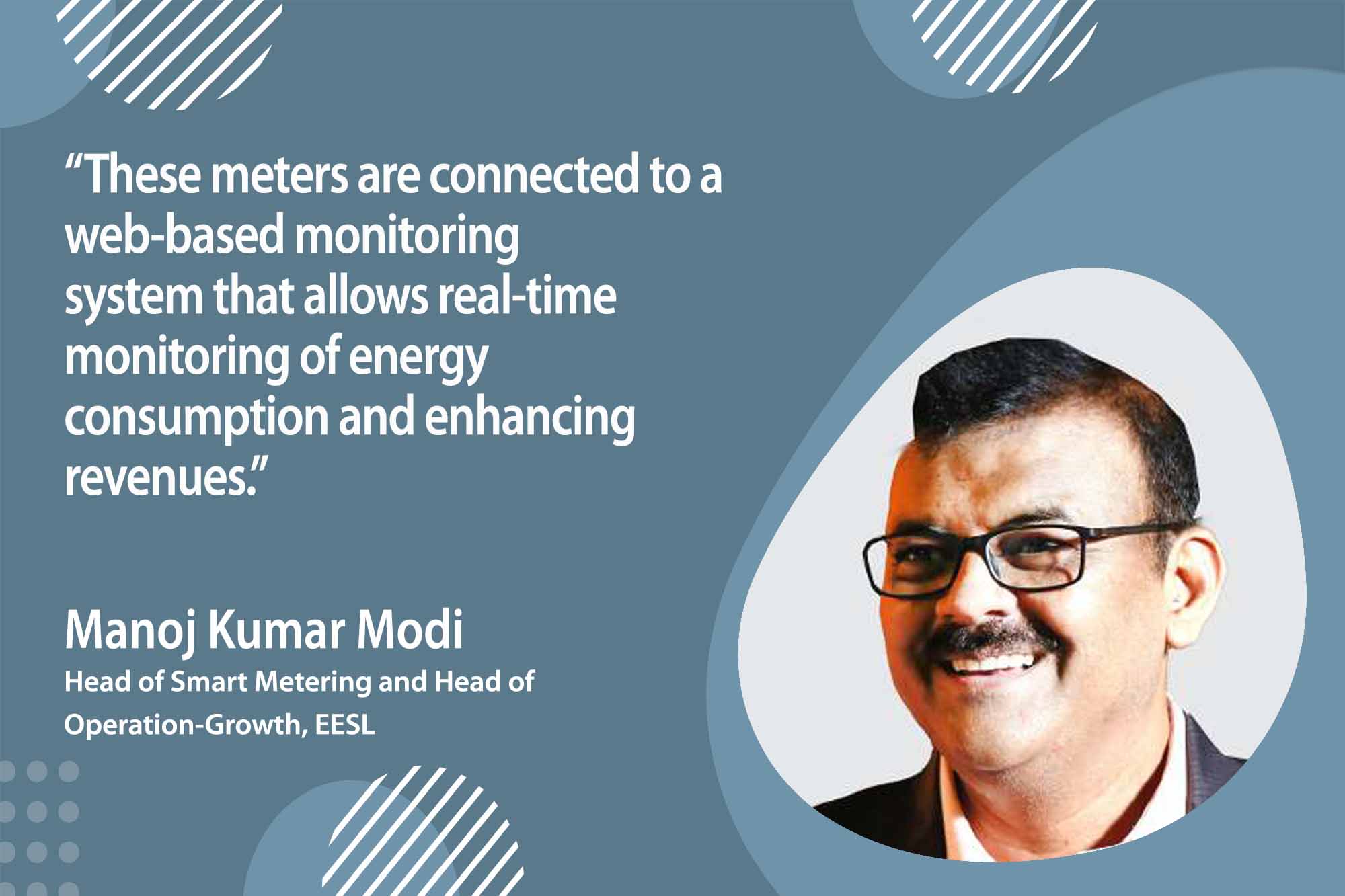Urbanisation spurs the adoption of smart metering
By EPR Magazine Editorial February 19, 2024 4:47 pm IST
By EPR Magazine Editorial February 19, 2024 4:47 pm IST

These meters are connected to a web-based monitoring system that allows real-time monitoring of energy consumption and enhancing revenues.
The utility sector in India is undergoing a profound digital transformation driven by government initiatives, urbanisation, and the need for efficiency. Smart technologies like metering play a pivotal role. Manoj Modi talks about the evolving industry with the EPR Magazine.
What are the key factors driving the digital transformation in the utilities sector?
Digital transformation has emerged as a catalyst for change within India’s utilities sector, ushering in an era of heightened efficiency, sustainability, and customer engagement. This transformative shift is primarily propelled by governmental initiatives like Digital India and the Smart Cities Mission, which are encouraging utilities to adopt digital technologies to improve efficiency and service delivery. Furthermore, the escalating pace of urbanisation amplifies the demand for utilities, compelling industry players to embrace digital solutions such as smart metering and automated billing systems to meet evolving needs effectively.
Additionally, the rapid urbanisation in India has led to a surge in demand for utility services, prompting utilities to increasingly adopt digital solutions like smart metering, predictive maintenance, and automated billing systems. These digital tools enhance operational efficiency and improve the overall customer experience. Also, utilities are grappling with mounting cost pressures due to rising fuel prices, ageing infrastructure, and regulatory requirements. To address these challenges, digital transformation becomes crucial, enabling utilities to streamline operations, reduce overhead costs, and optimise resource utilisation.
How does smart metering technology help to curb AT&C losses?
Innovative metering technology has significantly changed the billing and collection efficiency of power distribution companies. These meters are connected to a web-based monitoring system that allows real-time monitoring of energy consumption, reducing commercial losses for utilities, enhancing revenues, and serving as an important tool in power sector reforms. The manual revenue collection system, which was inefficient and led to financial losses for DISCOMs, has been revamped with smart meters.
Additionally, our smart meters ease end consumers as they can monitor their power consumption through a mobile-based app and select tariffs that fit their budget. They have significantly reduced AT&C losses by providing effective load monitoring and timely disconnection of defaulters, improving cash flow for DISCOMs.
What innovative products/solutions does your company offer?EESL with its JV IntelliSmart, is implementing a smart metering programme to improve distribution companies’ billing and collection efficiencies significantly. EESL has cemented MoUs and agreements for smart meters with states including Andhra Pradesh, Uttar Pradesh, Haryana, Bihar, NDMC-Delhi, and Telangana. EESL has successfully installed over 37.79 lakh smart meters in Uttar Pradesh, Delhi, Haryana, Bihar, Rajasthan, and Andaman under this groundbreaking programme.
Additionally, EESL is facilitating India’s transition to net zero through its pioneering one-stop marketplace, offering a comprehensive range of energy efficiency solutions, products, and government schemes. Standardised agreements for products and services will streamline processes and scale up the energy efficiency market, integrated with cutting-edge information technology to expedite project approvals and implementation.
Despite progress, what persistent challenge is the smart meter industry facing?
Integrating smart electricity technologies presents a key challenge in ensuring grid flexibility, particularly with the variability and intermittency introduced by renewable energy sources like solar and wind power. Grid operators must effectively balance supply and demand to maintain a stable power supply amidst these fluctuations, requiring sophisticated grid management and control systems, especially when integrating distributed energy resources (DERs).
Another significant challenge is the need for more consumer awareness and willingness to adopt new technologies, which has hindered the expansion efforts of distribution companies. Moreover, the skill gap in transitioning to digital technologies has further exacerbated the inertia, particularly in remote regions of the country. However, initiatives such as awareness campaigns and skilling projects have played a vital role in spreading objective information about the advantages of smart meters, gradually increasing acceptance of this technology.
Despite these challenges, the transformational impact of smart meter technologies offers numerous opportunities for enhancing grid resilience, promoting renewable energy integration, and optimising energy markets. By addressing these challenges through targeted initiatives and fostering stakeholder collaboration, India can unlock the full potential of smart electricity technologies to build a more efficient, sustainable, and resilient energy ecosystem.
Spokesperson: Manoj Kumar Modi, Head of Smart Metering and Head of Operation-Growth, EESL
We use cookies to personalize your experience. By continuing to visit this website you agree to our Terms & Conditions, Privacy Policy and Cookie Policy.